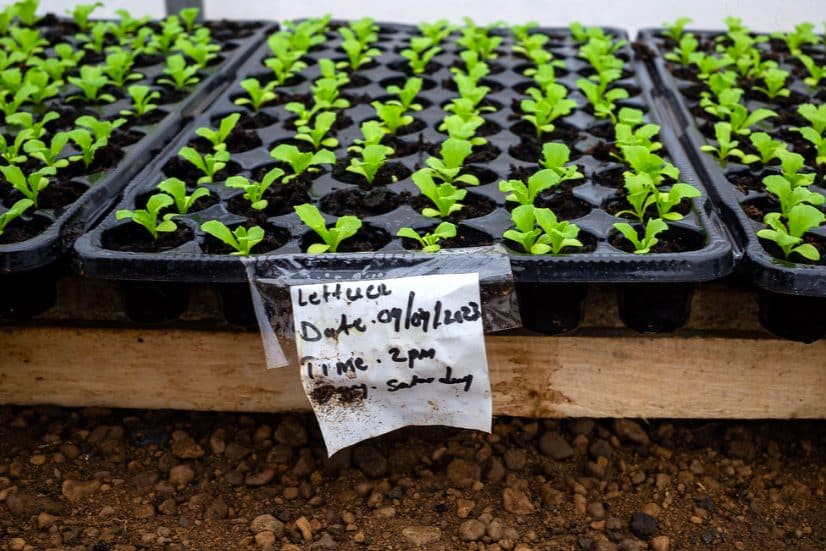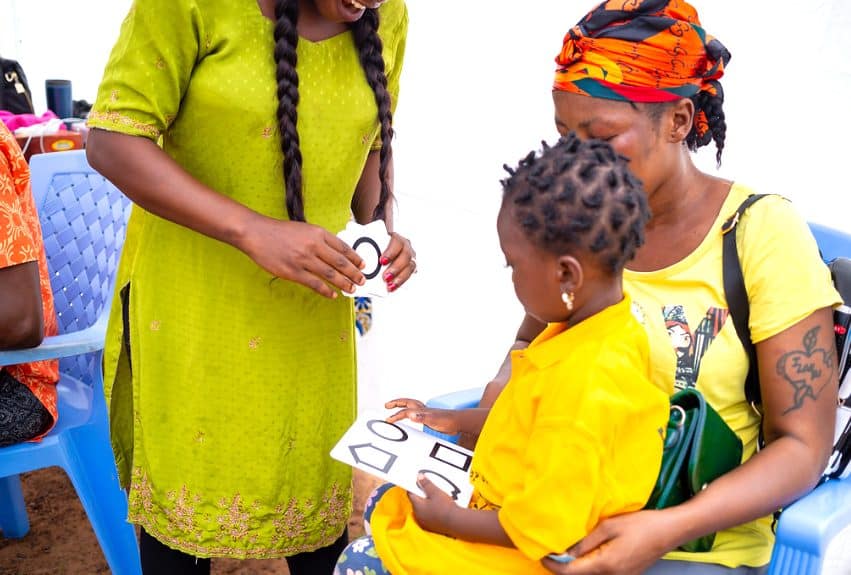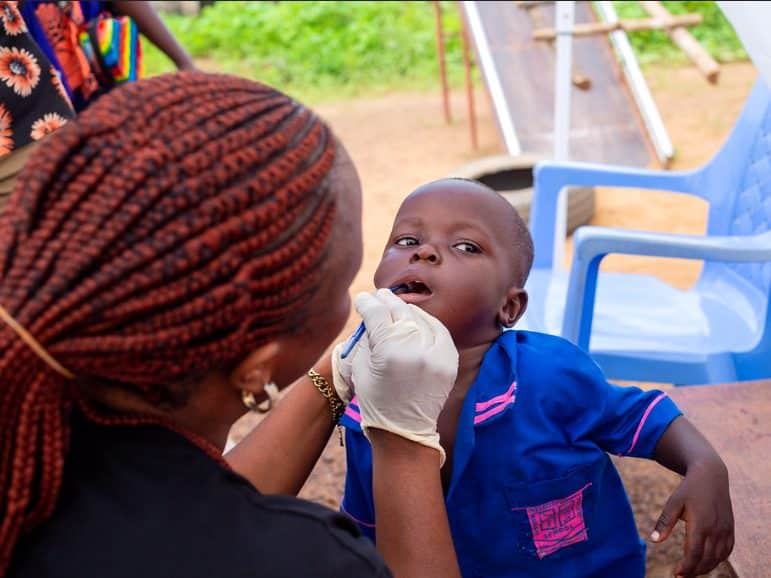Visitors to Our Lourdes Preschool in the Sierra Leone city of Port Loko will immediately notice a new, unique feature: a thriving teaching garden now adorns the school grounds. They may also see groups of young children gathered under a newly built, brightly painted ramada for story time, or garden staff and teachers instructing children on how to care for freshly sprouted crops housed in the brand-new greenhouse.
The teaching garden is the centerpiece of Project SHINE!, an ICAP-led initiative funded by Columbia World Projects that involves interdisciplinary collaboration across Columbia University and deep engagement with the government and key community stakeholders in Sierra Leone. ICAP and architect Amale Andraos, professor and dean emeritus of Columbia University’s Graduate School of Architecture Planning and Preservation (GSAPP), are working with the Sierra Leone government – through the Ministry of Basic and Senior Secondary School Education (MBSSE) – health authorities, parents, and educators to develop and test “wraparound” health and nutrition services for children attending preschool that, if successful, can be scaled to the national level.
In Sierra Leone, once children receive their second measles vaccine at 15 months, they overwhelmingly disappear from the health system until they begin attending primary school at age five. Meanwhile, a 2021 national nutrition survey revealed that over a quarter of Sierra Leonean children under five years of age are stunted, 13 percent are underweight, and 4.7 percent are wasted. The under-five mortality rate is among the highest in the world – at 108 per 1,000 live births – due in large part to preventable conditions like malaria, diarrhea, and pneumonia.
Recent government commitment to accelerating implementation of the 2020 Sierra Leone School Health Policy has amplified interest in addressing poor child health outcomes. With an estimated 10 to 20 percent of the country’s one million children aged two-to-five years currently enrolled in preschool, this policy outlines detailed education and health requirements for the country’s preschool-aged children. What was missing, however, were concrete guidelines on how to make it happen.
The national policy “articulated very well that children should receive education and health services, and their rights should be protected … but in terms of implementing that policy on the ground, there was a major gap,” said Amon Njenga, ICAP in Sierra Leone’s team lead for special projects.

“So we sat together with the government, and we designed guidelines to operationalize a broad policy statement that requires children at that age to be screened for sight, hearing, skin diseases, malaria, and other ailments, and to be assessed for whether they are receiving all their vaccinations according to national guidelines,” explained Mame Toure, ICAP in Sierra Leone’s country director. “They also need to be screened for malnutrition and to see if they are developing well according to their age.”
A year ago, the ICAP team – in partnership with local health authorities and a community advisory group consisting of parents and caretakers, Port Loko leaders, and other community members – began piloting many of these new preschool health guidelines at a single demonstration site, Our Lourdes Preschool. Thus far, the project has established the nutritional teaching garden, implemented a preschool-based health unit headed by a nurse, upgraded sanitation and kitchen facilities, and initiated household health visits and community health days to reach family members of preschool students. It has also connected students to local health facilities following a baseline health assessment for children attending the preschool.
To develop the innovative teaching garden component, ICAP worked with Dr. Andraos and her team as well as local engineer and agriculturist to design and build solar powered drip irrigation and a greenhouse for the school, enabling the planting and growing of an organic garden during both the rainy and dry seasons. The garden includes a new ramada – a roofed shelter with open sides – that teachers can use as an outdoor classroom for children to gather under and learn about gardening, using curricula developed by Project SHINE! Parents, community members, and teachers are also educated in cultivating such crops as sweet peppers, lettuce, okra, cucumbers, and sweet potatoes, all of which were chosen based on feedback from the community.
“A major element of this project is to try and teach the kids about gardening, how these crops grow, what is important for nutrition, where are the vegetables coming from, and what is their role in keeping our bodies healthy,” explained Toure. “The children are involved in all stages of the gardening, from land preparation to planting, to irrigation, and to monitoring how the plants are growing. One of the major aims of this project is to make sure these children understand where the food they are eating comes from.”
Though Sierra Leone possesses an abundance of land, very few people farm it, Toure said.
“If you come to Sierra Leone today, we have all the land, but we can’t feed ourselves, so we need to teach the kids about gardening,” agreed Yakoya Kamara, a parent and chairperson of Our Lourdes Preschool’s parent teacher association. Her daughter Medsatu, 6, is in her final year at the school.
Betty Magadalene, Our Lourdes Preschool’s head teacher, has been teaching for 30 years, 15 of them at Our Lourdes. Along with malaria, anemia is the biggest health problem faced by the school’s student population, she said, in part because of food insecurity at home.
“Some of the homes do not have enough food,” she explained, or their meals are imbalanced because of an overload of carbohydrates.
Before the teaching garden, students would throw away any lettuce that accompanied their meals; now, Kamara said, they are eager to not only try the lettuce, but they also bring their newfound knowledge home to their families.
“Now, if you come to our school, you see the beauty of the school, you see a green garden, you see solar panels. There has been a great transformation in the school and now everybody wants to bring their kids here,” Kamara said. “I am very boastful. I say I have one of the best preschools in the northwest region.”

About ICAP
A major global health organization that has been improving public health in countries around the world for two decades, ICAP works to transform the health of populations through innovation, science, and global collaboration. Based at Columbia Mailman School of Public Health, ICAP has projects in more than 40 countries, working side-by-side with ministries of health and local governmental, non-governmental, academic, and community partners to confront some of the world’s greatest health challenges. Through evidence-informed programs, meaningful research, tailored technical assistance, effective training and education programs, and rigorous surveillance to measure and evaluate the impact of public health interventions, ICAP aims to realize a global vision of healthy people, empowered communities, and thriving societies. Online at icap.columbia.edu








